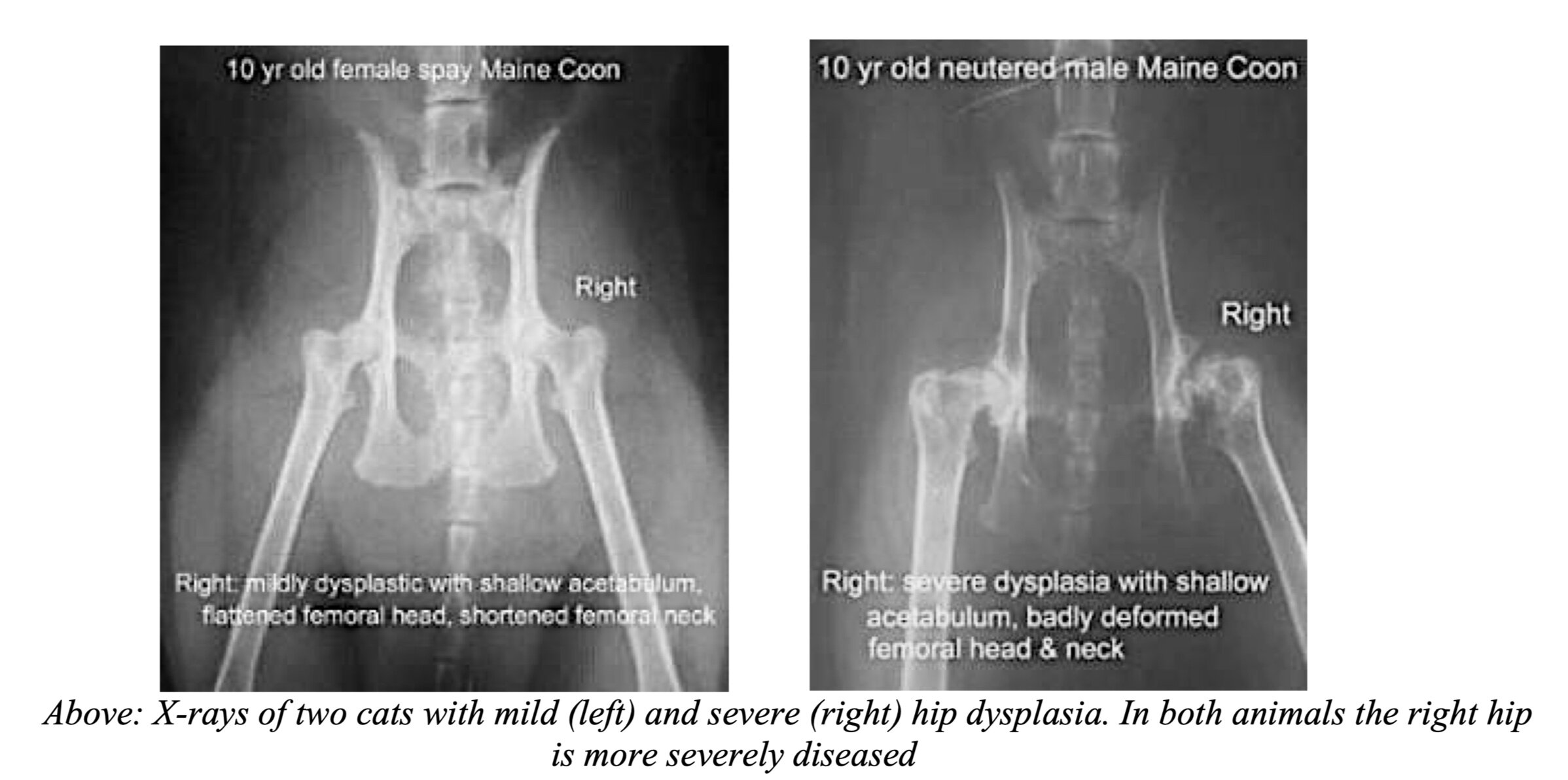Heart Echo & Hip X-Ray Screening Results
Before I jump in and reveal the results of our recent heart echo and hip x-ray screening, I thought it might be helpful to first talk a little about the disorders we are screening for and why we don’t rely on genetic testing alone.
What is Hypertrophic Cardiomyopathy and why is it so important to health screen for it?
Hypertrophic Cardiomyopathy (HCM) is the most common form of heart disease found in domestic cats, with affected animals at risk of developing congestive heart failure and occasionally sudden death. This disease is characterized by an abnormal thickening (hypertrophy) of one or several areas of the walls of the heart, usually of the left ventricle. While a specific genetic defect (mutations in MYBPC3 gene) has been identified in Maine Coon cats (involving a contractile protein: the myosin binding protein C), it cannot be excluded there are other mutations also causing HCM disease.
Many cats with HCM are asymptomatic and very often show no symptoms before they are six months old. HCM is not a congenital defect, but a disease that develops slowly over time. The disease is typically discovered when listening to the heart and abnormalities such as heart murmur(s), arrhythmias and/or extra heart sounds are heard. This is why it’s important that Maine Coon cats used in a breeding program are not only DNA tested for HCM, but also undergo routine cardiac exams performed by a board certified veterinary cardiologist.
It is important to note that negative testing does not guarantee a kitten or cat will never develop HCM later in life. it does however greatly reduce the risk. And, you can be confident that breeders who participate in both genetic and cardiac heart screening are using all of the tools available to them in order to prevent the transmission of heart related conditions to offspring.
Hip Dysplasia? Isn’t that a dog thing?
While Hip Dysplasia (HD) has long been described in many dog breeds as an inherited disorder, it was not well known in cats until the last decade or so. Peer reviewed and published research has shown that this disease not only exists in the cats, but that it is likely an inherited disorder.
Cats in general are very good at hiding their pain and can suffer from hip dysplasia without any visible signs. On the other hand, some cats with hip dysplasia, especially the more severely affected, will have obvious symptoms and experience pain. They may be stiff when they walk and may be reluctant to jump or climb. They may appear lame from time to time. In some cases, the symptoms only appear after a traumatic event such as a fall.
No single gene is thought to be responsible for hip dysplasia in either the dog or the cat, but rather a complex interplay of several genetic factors. Cats who are affected with hip dysplasia have parents who are either carriers or themselves affected. And, just as in dogs, the breeds of cats most likely to have hip dysplasia are the larger, heavy-boned breeds. Since Hip Dysplasia cannot be genetically tested for, hip x-ray screening is a crucial part of eliminating the disorder, especially in breeds at high risk such as the Maine Coon.
Several screening programs exist, including the Orthopedic Foundation for Animals (OFA), PennHIP, and PawPeds Health Programs. While these programs may use different grading systems, all attempt to rule out hip related issues (Excellent/Good/Fair hip grading) or classify the severity of hip dysplasia in order to determine which animals are appropriate to breed.
So, how about those test results?
After much research, we decided to work with the Orthopedic Foundation for Animals (OFA) and PawPeds Health Program collectively. OFA has a unique certification process that was attractive, and PawPeds offers the option for results provided through their health program to be linked directly to each cat’s pedigree.
With that being said, we are happy to announce that all of the Lake View Coons breeding Maine Coons passed both their heart and hip screening. And, In an effort to be transparent, these results have been made visible to the public and can be viewed by visiting the corresponding links found under each of our king’s and queen’s profile page.
References:
K.M. Meurs, et al.: A cardiac myosin binding protein C mutation in the Maine coon cat with familial hypertrophic cardiomyopathy, Hum. Mol. Genet. 14 (2005) 3587-3593.
Longeri M, Ferrari P, Knafelz P, Mezzelani A, Marabotti A, Milanesi L, Pertica G, Polli M, Brambilla PG, Kittleson M, Lyons LA, Porciello F.: Myosin-binding protein C DNA variants in domestic cats (A31P, A74T, R820W) and their association with hypertrophic cardiomyopathy. J Vet Intern Med. 2013 Mar-Apr;27(2):275-85.
Gierson J. (2012) Hips, elbows and stifles: common joint diseases in the cat. Journal of Feline Medicine and Surgery, 14(1), 23-30.
Keller GG, Reed AL, Lattimer JC & Corley EA (n.d.). Hip dysplasia: a feline population study. Veterinary Radiology & Ultrasound: The Official Journal of the American College of Veterinary Radiology and the International Veterinary Radiology Association, 40(5), 460-4.
Perry K. (2016). Feline hip dysplasia: A challenge to recognize and treat. Journal of Feline Medicine and Surgery, 18(3), 203-18.
https://www.winnfelinefoundation.org/docs/default-source/cat-health-library-educational-articles/feline-hip-dysplasia-2016.pdf?sfvrsn=2
Additional sources:
https://pawpeds.com/healthprogrammes/hcm.html
https://www.ofa.org/diseases/other-diseases/cardiac-disease
https://pawpeds.com/healthprogrammes/hd.html
https://www.ofa.org/cat-hips



